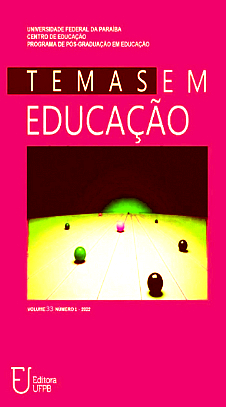A pessoa com deficiência e a educação inclusiva
uma reflexão a partir das linhas abissais
DOI:
https://doi.org/10.22478/ufpb.2359-7003.2024v33n1.67044Keywords:
Inclusion. Person with Disability. Education. Abyssal Lines.Abstract
This article, with a qualitative, theoretical and reflective approach, seeks to discuss the problem of the exclusion of people with disabilities in our society, in terms of Educational Inclusion. The main contribution is the theoretical references of Boaventura de Souza Santos on the "Abyss Lines", in the sense of proposing possibilities for dialogues regarding the rights of people with disabilities, according to official documents such as the Federal Constitution of 1988 and the National Policy for Special Education (PNEE) of 2008. To this end, an overview of people with disabilities from the 20th century onwards is presented, followed by an explanation of inclusive education. It is a part of the doctoral research in progress and, therefore, intends to weave a dialogue about the Abyssal Lines and other paths for educational inclusion.
Downloads
References
AINSCOW, M. Tornar a educação inclusiva: como esta tarefa deve ser conceituada? In UNESCO / organizado por Osmar Fávero, Windyz Ferreira, Timothy Ireland e Débora Barreiros. Tornar a Educação Inclusiva. Brasília: UNESCO, 2009. 11-25 p. Disponível em: https://crianca.mppr.mp.br/arquivos/File/publi/educacao_inclusiva/educacao_inclusiva_unesco_2009.pdf . Acesso em 15/01/2023.
BEGALLI, A. S. M. Biopolitica, ações afirmativas e a pessoa humana com deficiência: um diagnóstico do processo de inclusão escolar no Brasil. Tese de Doutorado. USF. Itatiba, 2021. Disponível em: https://www.usf.edu.br/galeria/getImage/427/961605754442512.pdf
Acesso em 10/01/2023.
BEGALLI, A. M.; SILVEIRA, C. R. da. A inclusão da pessoa com deficiência na educação brasileira: uma visão biopolítica. Revista da Faculdade de Direito do Sul de Minas, Pouso Alegre, Edição Especial: 1-19, 2019. Disponível em: https://www.fdsm.edu.br/conteudo/artigos/7a1ff2d6cf1fdde7219c0c9ef91725cd.pdf . Acesso em 28/05/2023.
BELLAMY, C. The State of the World’s Children: Education. Nova York: UNICEF, 1999.
BRASIL. SEESP/MEC. Política nacional de educação especial na perspectiva da educação inclusiva. Brasília: MEC, 2008. Disponível em: http://portal.mec.gov.br/arquivos/pdf/politicaeducespecial.pdf Acesso em 10/01/2023.
BRASIL. Conselho Nacional de Educação. Resolução n. 2, de 11 de setembro de 2001. Diretrizes Nacionais para a Educação Especial na Educação Básica. Brasília: CNE/CEB, 2001. Disponível em: http://portal.mec.gov.br/cne/arquivos/pdf/CEB0201.pdf. Acesso em 16/12/2022.
BRASIL. LEI Nº 13.146, DE 6 DE JULHO DE 2015. Lei Brasileira de Inclusão da Pessoa com Deficiência (Estatuto da Pessoa com Deficiência). Disponível em: https://www.planalto.gov.br/ccivil_03/_ato2015-2018/2015/lei/l13146.htm#:~:text=Art.%201%C2%BA%20%C3%89%20institu%C3%ADda%20a,sua%20inclus%C3%A3o%20social%20e%20cidadania. Acesso em 20/02/2023.
BRASIL. MINISTÉRIO DA EDUCAÇÃO. Plano de Desenvolvimento da Educação: razões, princípios e programas. Brasília: MEC, 2007 a. Disponível em: http://portal.mec.gov.br/arquivos/livro/livro.pdf . Acesso em 10/01/2023.
BRASIL. DECRETO Nº 6.094, DE 24 DE ABRIL DE 2007 b. Plano de Metas Compromisso Todos pela Educação. Diponível em: https://www.planalto.gov.br/ccivil_03/_ato2007-2010/2007/decreto/d6094.htm . Acesso em 13/01/2023.
BRASIL. DECRETO Nº 6.949, DE 25 DE AGOSTO DE 2009. Convenção Internacional sobre os. Direitos das Pessoas com Deficiência e seu Protocolo Facultativo, assinados em Nova York, em 30 de março de 2007. Disponível em: http://portal.mec.gov.br/dmdocuments/decreto6949_seesp.pdf Acesso em: 14/12/2022.
BRASIL. Constituição da República Federativa do Brasil : texto constitucional promulgado em
de outubro de 1988. – Brasília: Senado Federal, Coordenação de Edições Técnicas, 2016. 496 p. Disponível em: https://www2.senado.leg.br/bdsf/bitstream/handle/id/518231/CF88_Livro_EC91_2016.pdf . Acesso em 13/01/2023.
BRASIL. Congresso Nacional. Lei de Diretrizes e Bases da Educação (Lei nº 9.394). Brasília, Centro Gráfico, 1996. Disponível em: http://portal.mec.gov.br/seesp/arquivos/pdf/lei9394_ldbn1.pdf . Acesso em 13/01/2023.
LANNA JÚNIOR. M. C. M. (Comp.). História do Movimento Político das Pessoas com Deficiência no Brasil. Brasília: Secretaria de Direitos Humanos. Secretaria Nacional de Promoção dos Direitos da Pessoa com Deficiência, 2010. 443p. Disponível em: https://files.cercomp.ufg.br/weby/up/211/o/História_do_Movimento_Político_das_Pessoas_com_Deficiência_no_Brasil.pdf?1473201976 . Acesso em 15/01/2023
MANTOAN, M. T. E. Inclusão escolar: o que é? por quê? como fazer? São Paulo: Moderna, 2003.
MOREIRA, L. C.; BAUMEL, R. C. R. C. Currículo em educação especial. Educar, Curitiba, n. 17, p. 125-137. 2001. Editora da UFPR. Disponível em: http://www.educaremrevista.ufpr.br/arquivos_17/moreira_baumel.pdf . Acesso em 15/01/2023.
SAMPAIO, CT; SAMPAIO, SMR. Educação inclusiva: o professor mediando para a vida [online]. Salvador: EDUFBA, 2009.
SANTOS, B. S. Para além do pensamento abissal: das linhas globais a uma ecologia dos saberes. In SANTOS, Boaventura Souza; MENEZES, Maria de Paula (Org.). Epistemologias do Sul. Coimbra: Edições Almedina SA. 2009.
SANTOS, B. S. Entrevista com professor Boaventura de Souza Santos. Disponível em: http://www.dhi.uem.br/docentes/jurandir/jurandirboaven1.htm , 1995. Acesso em 13/01/2023.
SASSAKI, R. K. . Terminologia sobre deficiência na era da inclusão. In: VIVARTA, V. (Org.) Como chamar as pessoas que têm deficiência? São Paulo: RNR, 2003.
UNESCO. The Open File on Inclusive Education. Paris: UNESCO, 2001.
VITELLO, S. J.; MITHAUG, D. E. (Eds.). Inclusive Schooling: National and international perspectives. Mahwah, NJ: Lawrence Erlbaum, 1998.
Downloads
Published
How to Cite
Issue
Section
License
Copyright (c) 2023 Revista Temas em Educação

This work is licensed under a Creative Commons Attribution 4.0 International License.
Authors who publish in this journal agree to the following terms:
. Authors retain the copyright and grant the journal the right to first publication, with the work simultaneously licensed under the Licença Creative Commons Attribution that allows the sharing of the work with acknowledgment of authorship and initial publication in this magazine. . Authors are authorized to assume additional contracts separately, for non-exclusive distribution of the version of the work published in this journal (eg, publishing in institutional repository or as a book chapter), with acknowledgment of authorship and initial publication in this journal.
. Authors are permitted and encouraged to publish and distribute their work online (eg in institutional repositories or on their personal page) at any point before or during the editorial process, as this can generate productive changes, as well as increase impact and citation of the published work (See O Efeito do Acesso Livre).



















